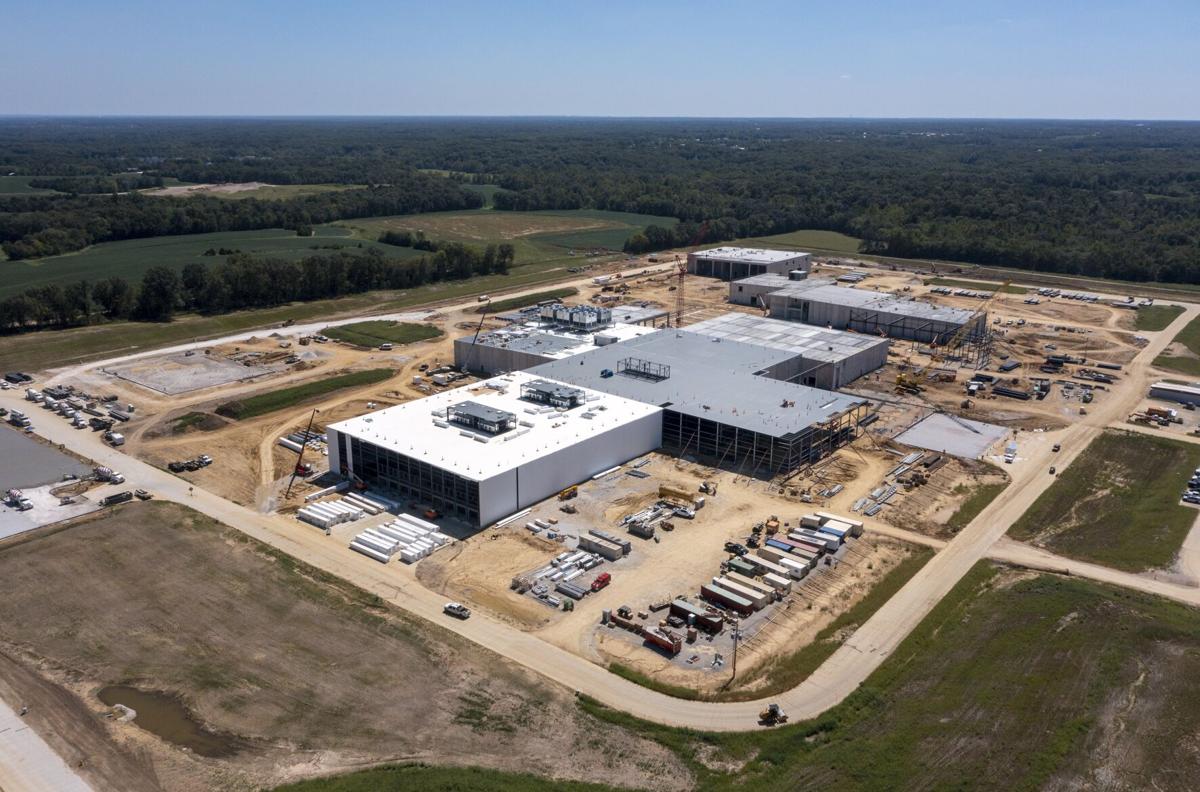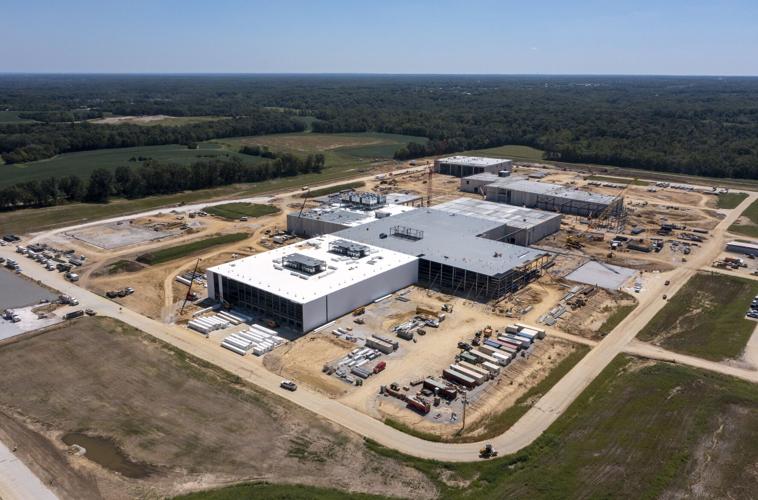JEFFERSON CITY ŌĆö An under-construction beef processing plant on the western edge of the 51║┌┴Ž metro area is generating concerns about water pollution amid millions of dollars in state subsidies.
As Gov. Mike ParsonŌĆÖs administration attempts to boost Missouri as a top beef producing state, the American Foods Group meat plant on the eastern edge of Wright City has been hailed for bringing as many as 1,300 jobs to the Warren County community once it is built.
But, comments submitted to the Missouri Department of Natural Resources about the Wisconsin-based meatpackerŌĆÖs plan for processing waste water from the slaughterhouse operation just south of Interstate 70 show residents who live miles from the facility are concerned about pollution.
People are also reading…
Lake Saint Louis resident Carolee Seith, who has lived in the community for 34 years, told the DNR sheŌĆÖs worried the company will dump ŌĆ£animal parts into our lakes.ŌĆØ
ŌĆ£Please be advised that children swim in these lakes as do we adults. Please do not permit this atrocity to endanger our health as well as destroy the quality of our lakes,ŌĆØ Seith wrote.

A boat glides along the water of Lake Saint Louis on Thursday, Aug. 31, 2023. The lake was formed when a dam was built across Peruque Creek.
The comments are part of a public record being compiled by regulators as they assess the environmental impact of the project at the same time politicians are praising the impact of jobs in the region.
The $800 million plant has been in the works for years, with AFG announcing in July 2002 it had secured final financial backing and would break ground on the new, state-of-the-art beef harvest plant, just a few miles from Wentzville, one of the fastest-growing areas of the state.
The facility is expected to process about 2,400 cattle per day for ground beef, boxed beef, steaks, meat snacks and pet food, the company says.
Parson, who operates his own small cattle operation in Bolivar, said he ŌĆ£couldnŌĆÖt be more excitedŌĆØ about the new plant when the groundbreaking was underway last year. Missouri is rated third in beef production in the nation.
But, like other concerns raised by residents across the state affected by the waste generated by the production of beef, pork and poultry products, people who live within the watershed affected by the new plant are pushing back.
ŌĆ£We play, swim and fish in Lake Saint Louis and our daily lives will be adversely impacted by contamination of its waters. Our lake should not be subjected to incoming pollutants that would disrupt the safe use of the lake water for recreation,ŌĆØ wrote Lake Saint Louis resident Melissa Hutcherson.
Under the plan being considered by the state regulators, waste from the facility would be processed and then released into Peruque Creek, which crosses the Warren County line south of I-70 as it passes through Foristell.
From there, the waterway flows past a city park, winds through another city park in Wentzville and then heads east toward Quail Ridge Park, operated by St. Charles County.
On its way, the creek borders a number of housing developments, some of them home to workers at the nearby General Motors truck and van factory north of I-70, which also releases waste water into the lake.
Eventually, the creek flows southeast to Lake Saint Louis, located about 14 miles from the AFG plant.

Peruque Creek, foreground, flows eastward under Highway 40 (Interstate 64) into Lake Saint Louis on Thursday, Aug. 31, 2023. Some residents of Lake Saint Louis are concerned a new meat processing plant in Wright City could potentially pollute the creek and lake.
The Lake Saint Louis Community Association, representing residential property owners, has hired legal representation to address the issue.
In comments to Natural Resources officials, attorney Ross Kaplan said the department should determine whether there are other alternatives to releasing treated beef plant waste into the creek.
ŌĆ£Lake Saint Louis receives significant silt deposits from Peruque Creek in its ordinary course before effluent is added to its waters. Those deposits currently cost the community nearly half a million dollars per year in dredging in order to maintain the current composition of the lake,ŌĆØ Kaplan wrote.
ŌĆ£The Department must consider these effects, not only of what the effluent will do to the composition of the water, but also what the effluent will do to the composition of the bodies of water,ŌĆØ Kaplan added.
Statewide issues
The concerns along the waterways affected by the American Foods GroupŌĆÖs factory are mirrored elsewhere in Missouri.
A beef packer in Pleasant Hope, for example, has drawn attention for its plan to potentially pump 350,000 gallons of treated wastewater per day into Pomme de Terre River, which flows into a lake of the same name.
In Randolph County, residents recently expressed outrage at a plan by an Arkansas companyŌĆÖs plan to pump meat processing waste delivered by trucks, some possibly from out of the state, into a 15 million gallon lagoon, where the slurry would later be applied to area farm fields as fertilizer.
In this yearŌĆÖs state budget, officials earmarked at least $70 million in direct spending potentially benefiting the ranching industry.
The budget includes $43 million to build a new veterinary medical diagnostic laboratory at the University of Missouri designed to benefit livestock producers and companion animal owners.
Mizzou also is receiving $25 million for a so-called meat laboratory, which will process all types of livestock, not just beef.
In addition, lawmakers approved $1 million to create a national cattle registry and database for multiple breed associations.
Administration officials said they are reviewing public comments received on the initial survey of how the factoryŌĆÖs operations may affect the watershed.
ŌĆ£The next step in the process is for the facility to submit a complete permit application, which is their official request for authorization to discharge treated wastewater,ŌĆØ a DNR spokesman said.
After that, the agency will draft a decision, which will then be open again for public comment before a final decision is made.
Heather Peters, branch chief of Water Pollution Control for DNR said a timetable for the process is in flux.
Company officials could not be reached for comment.
Meantime, before the plant has received its permits to operate, AFG has pledged $2 million to the Wright City school district to help with construction of a new football stadium.
According to local news reports, the new stadium will be named AmericaŌĆÖs Heartland Stadium, which is linked to the factory name of AmericaŌĆÖs Heartland Packing.
Two Missouri hog farms, operated by Chinn Thrasher & Thrasher Farm Partnership, in Macon and Shelby counties were cited by the Missouri Department of Natural Resources for having leaking waste lagoons that contaminated nearby freshwater streams. This farm in Atlanta, Mo was cited by DNR for having “Swine manure was flowing through this trench and down the hillside through an extensively eroded set of trenches,”.
Video by David Carson, dcarson@post-disaptch.com
















